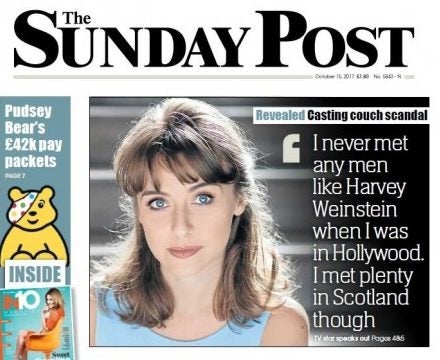
The UK’s larges press regulator has upheld an accuracy complaint from actress Joanne Thomson against the Sunday Post in Scotland, despite the In Plain Sight star having been given partial copy approval.
Thomson claims the Post wrongly gave the impression that she thought the so-called “casting couch” culture was worse in her native Scotland than in the US in an article published in October last year in print and online.
The piece followed an interview that she claimed had been “misreported” in her complaint to the Independent Press Standards Organisation under Clause 1 (accuracy) of the Editors’ Code of Practice.
The article was trailed on the front page with the headline: “I never met any men like Harvey Weinstein when I was in Hollywood. I met plenty in Scotland though.”
The inside strapline for the coverage, which ran across pages four and five, read: “Actress speaks out in wake of casting couch scandal and says sexism and harassment in Scotland is as bad as Hollywood.”
The article claimed Thomson had said that “women are routinely harassed and hounded by powerful men in the Scottish screen industry” and that a “casting couch culture still exists in Scotland”.
Thomson told the article had misreported the interview she had given.
She said the newspaper had attributed comments to her that she had not made and omitted a number of points that she had made, in order to misrepresent the views she had expressed.
She said that the views expressed in the article were those of the male reporter, not her own
She denied that she had told the Post, in relation to her US experiences: “All I know is that I did not experience the problems there that I have done here,” as reported in the article.
She said the Post journalist had called her prior to publication to check this line and she had approved it only because she knew that he was facing time pressures, according to IPSO.
The quote was not found in the notes of the reporter, or a transcript of the interview recorded by Thomson.
The Post apologised for any frustration it had caused the complainant, but did not accept that it breached guidelines.
It said the article formed part of its wider coverage of sexual harassment in Scotland, which was a matter of public interest, and said Thompson’s interview had been endorsed by others in the screen industry.
The newspaper said it considered that it had “substantially reported the complainant’s comments accurately” and did not believe the article misrepresented her view, IPSO said.
Although it accepted that the recording and transcript provide by Thomson were an “accurate representation” of the 50-minute interview, it said the journalist spent almost two hours with her and had continued to ask questions and take notes.
However, the regulator found that the paper had breached its accuracy clause by not taking care over Thomson’s claim that sexism and harassment was as bad in Scotland as it was in Hollywood.
The Complaints Committee said: “The newspaper had published a significantly misleading inside strapline, not supported by the text of the article, which was compounded by an inaccurate quotation reported in the article.
“The newspaper had offered to publish a correction, setting out the complainant’s position. However, the misattribution of quotes given as part of an interview was a serious failure to take care, and so the appropriate remedy was the publication of an upheld adjudication.”
The Post was ordered to publish the full adjudication on page four or sooner, and online, with a link appearing on the homepage, for 24 hours.
The full IPSO adjudication can be found here.
Email pged@pressgazette.co.uk to point out mistakes, provide story tips or send in a letter for publication on our "Letters Page" blog
